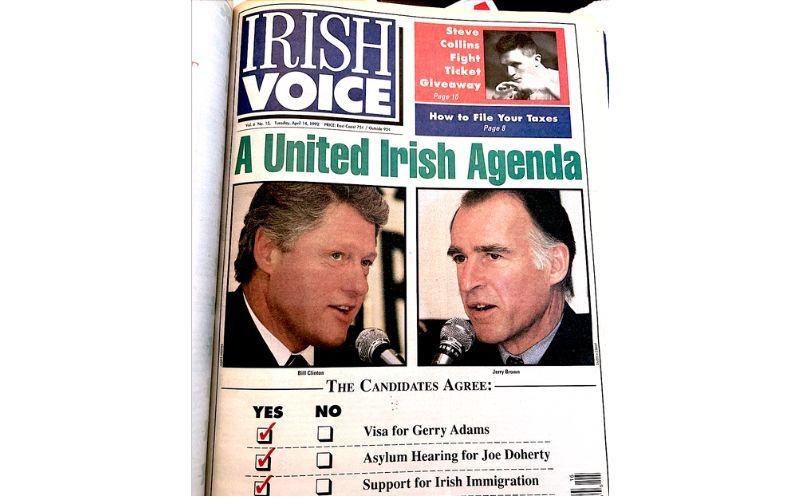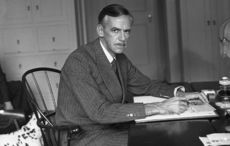If you lived through the 1980s in Ireland you’ll remember two things immediately — the Irish recession that was seemingly without end, and the best pop music you’ve ever heard.
Kevin Maher, the 43-year-old Dublin-born debut novelist, writes about both things with so much passion and urgency in his new novel The Fields (Little, Brown) that you’ll be amazed to think it was already half a lifetime ago.
In his new book Maher, who is now a feature writer, columnist and critic for The Times of London, introduces us to 14-year-old Jim Finnegan, a boy growing up in Dublin in a house filled with shouting girls. In that sense it’s not that much different to Maher’s own life (he has three sisters), which is what gives The Fields its completely convincing period details.
“I grew up in Dumdrum and I lived a life weirdly similar to Jim Finnegan,” Maher tells the Irish Voice. “We both like the same music, we’re both educated by the Christian Brothers. It almost pointless me describing my life because it’s all mixed up and messed about in the book.”
Like Jim in the book, Maher lived through a decade of extraordinary social change in Ireland where the main political parties and the Catholic Church were finally seeing their authority challenged by an increasingly restive new generation.
“I was on the cusp,” says Maher. “By the time I left high school (and I must add for legal reasons that my school is not the school in the book) there was only two brothers left and the rest of the classes were run by lay people who had somehow picked up the peccadilloes and styles of the Christian Brothers in that they were extremely violent and aggressive and boy hating. They displayed all the same things that made the Christian Brothers notorious without being men of the frock, as it were.”
In the book Jim, who has fallen for a flaxen haired beauty named Saidhbh (pronounced Sive, rhymes with hive) is being increasingly groomed by a young Catholic priest named Father O’Culigeen, who has nothing holy on his mind.
Jim is young and trusting, making him a setup for heartbreak and later, abuse. He’s focused on Saidhbh, and O’Culigeen is focused on him.
“I wasn’t abused by a priest, which is a relief, but I think the darkness in the book and the grimness of it came out of my experience, bar being raped, in that educational system,” says Maher, with the same matter-of-factness that he brings to his novel.
“I was a good student but I spent many classes watching students who weren’t as good as I was getting really very dangerously beaten up by grown men. It wasn’t unusual, and it only stopped by the time we became 17 or 18.
“That gave me a perspective from which to look at that kind of education. That went into the book as well.”
What kind of country were we, that we saw others brutalized and even raped, and instead of helping them find justice we instead shamed them into silence?
The Fields pulls no punches. It’s not a tourist book. Instead it lifts the lid on the rot that had engulfed the whole sorry edifice before the truth telling of the two decades that would follow.
“The people who were above us in the adult world were holding on to these old ideals,” Maher explains. “I remember in particular their creepy attitude to sexuality.
“The defining point for me was when I was 13, having to go to these Lenten Mass confessions with young visiting priests who would take us aside one by one and who were obsessed with talking about self-pleasure and touching yourself. The obsession with the sins of the flesh combined with the double whammy of relentless bouts of spontaneous violence for seemingly no reason.”
Maher’s father went to a Christian Brothers school and he would sort of jokingly remember it like this: “We’d come in on the morning and, oh ho ho, they would clip us on the ear as we would walk past.”
Maher didn’t find that funny. Teachers who would violently throw the duster at the blackboard and create this atmosphere of cowed submission among the boys. They ran the school like a concentration camp.
“I was a good student. I got away with a lot. I was chosen to run messages and things like that,” says Maher, who’s aware he dodged a bullet.
“I had a few inspirational teachers who I really got on with. It was a good education in terms of educational achievement. It was this weird paradox they were grooming you for a good education and career as they were destroying everyone around you.”
School life was weird and absurd. Poor students were being brutalized, adults were talking to them inappropriately about sex. This was an Irish adolescence in the 1980s. It’s all in his book.
“When I sat down to write the debut novel about Ireland in the 1980s it seemed very instinctive to write about this period through that 14-year-old voice. He’s a boy who’s still a bit of a boy who’s nevertheless confronting all the challenges of modernity,” Maher said.
In the book Jim’s musical interests are Soft Cell and Bronski Beat, but his friends in the council estate are more interested in nationalist politics. In The Fields and in the Ireland of the period, social class often determines how the characters feel about nationalism.
“Nationalism just seems so far away from Jim’s interests,” says Maher.
“Growing up I was fascinated by how complex nationalism is and how multilayered, and how there are class divisions within it. People were nationalistic but totally anti-IRA, or slightly pro the monarchy but singing Republican songs. It was complex.”
When people sing rebel songs in The Fields (at one point they refer to “The Fields of Athenry”) Maher focuses on how rousing and manipulative those songs can be. And not just the songs — also the stories of nationalism.
Another aspect of the book that will take some readers by surprise is the supernatural elements that creep in as it winds toward its moving conclusion. The Fields doesn’t just refer to the nationalist song title; it also refers to the body’s energy fields, those invisible new agey chakras that supposedly regulate our physical and spiritual wellbeing.
“When I went to write the book the place I chose to work on it was in the village of Findhorn in Scotland,” says Maher.
“In the next village there is a new age village where healers from all around the world to think up new ways of being. My wife as a treat sent me to see a Dutch healer. I sat down and I was a tiny bit rude.
“I told him this is not my thing and I don’t believe it. He just popped me up on his massage bed and he gently held onto my ankles. I went into massive spasms.
“Practically seconds after I said I do not believe this I was a fish out of water. That intrigued me and I decided I would put it in the book.”
It’s love, both for his beautiful girlfriend and his big boisterous family, that finally redeems young Jim in The Fields. That’s a lesson that’s as timely now as it ever was.
In his debut novel Maher has crafted a hilarious and heartbreaking coming of age story that rivals the young Roddy Doyle for its descriptive power, narrative force and its sheer joy in the making. It’s the debut of a major new talent and it deserves to find a wide audience.




Comments